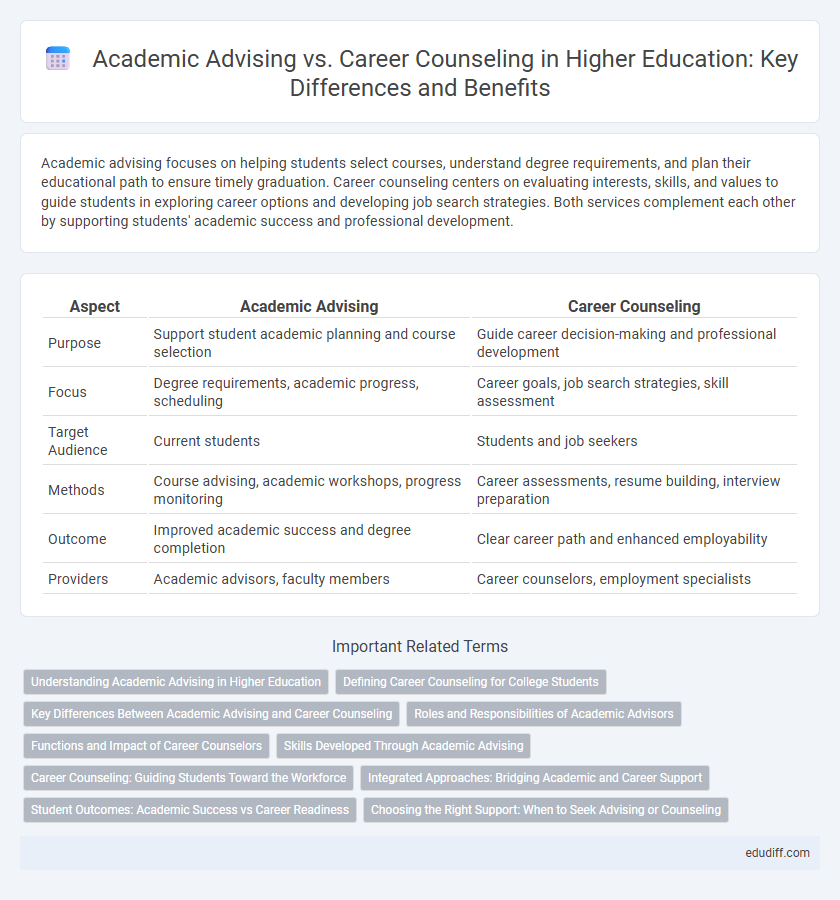Academic advising focuses on helping students select courses, understand degree requirements, and plan their educational path to ensure timely graduation. Career counseling centers on evaluating interests, skills, and values to guide students in exploring career options and developing job search strategies. Both services complement each other by supporting students' academic success and professional development.
Table of Comparison
| Aspect | Academic Advising | Career Counseling |
|---|---|---|
| Purpose | Support student academic planning and course selection | Guide career decision-making and professional development |
| Focus | Degree requirements, academic progress, scheduling | Career goals, job search strategies, skill assessment |
| Target Audience | Current students | Students and job seekers |
| Methods | Course advising, academic workshops, progress monitoring | Career assessments, resume building, interview preparation |
| Outcome | Improved academic success and degree completion | Clear career path and enhanced employability |
| Providers | Academic advisors, faculty members | Career counselors, employment specialists |
Understanding Academic Advising in Higher Education
Academic advising in higher education centers on guiding students through course selection, degree requirements, and academic policies to ensure timely graduation. Advisors provide personalized support to align students' academic goals with institutional resources and opportunities. This structured guidance enhances students' academic success and retention rates by fostering informed decision-making throughout their educational journey.
Defining Career Counseling for College Students
Career counseling for college students involves personalized guidance to help individuals identify career goals, explore industries, and develop job search skills. This process includes assessments of interests, values, and strengths to align academic choices with future employment opportunities. Effective career counseling enhances decision-making, increasing students' readiness for workforce integration.
Key Differences Between Academic Advising and Career Counseling
Academic advising primarily focuses on course selection, degree requirements, and academic progress to help students succeed in their educational path. Career counseling centers on exploring career options, developing job search strategies, and enhancing professional skills to prepare students for the workforce. While academic advising emphasizes academic planning, career counseling addresses long-term career goals and personal development.
Roles and Responsibilities of Academic Advisors
Academic advisors guide students in course selection, degree planning, and academic policies to ensure timely graduation and academic success. They monitor student progress, provide resources for academic challenges, and assist in maintaining enrollment status. Advisors also facilitate referrals to specialized support services, enhancing student retention and personal development.
Functions and Impact of Career Counselors
Career counselors provide personalized guidance to help students identify their strengths, interests, and career goals through assessments and one-on-one sessions. Their impact extends to improving employability skills, facilitating internship placements, and linking academic choices with labor market demands. By fostering informed decision-making, career counselors enhance student retention and long-term career satisfaction.
Skills Developed Through Academic Advising
Academic advising cultivates critical skills such as goal setting, time management, and decision-making, which empower students to navigate their educational pathways effectively. It enhances self-assessment abilities, enabling learners to align their academic choices with personal strengths and interests. These skills contribute to academic success and form a foundation for lifelong learning and career adaptability.
Career Counseling: Guiding Students Toward the Workforce
Career counseling provides students with personalized guidance to align their skills, interests, and values with viable career paths, enhancing workforce readiness. It emphasizes job market trends, resume building, interview preparation, and networking strategies to facilitate successful employment outcomes. This targeted support bridges the gap between academic experiences and professional opportunities, ensuring students are well-equipped for career transitions.
Integrated Approaches: Bridging Academic and Career Support
Integrated approaches in higher education combine academic advising and career counseling to create cohesive support systems that enhance student success. These frameworks leverage data analytics and personalized guidance to align students' academic paths with evolving labor market demands and individual career aspirations. By fostering collaboration between academic advisors and career counselors, institutions improve retention rates and prepare students for seamless transitions into the workforce.
Student Outcomes: Academic Success vs Career Readiness
Academic advising drives student outcomes by enhancing academic success through tailored course selection, degree planning, and skill development strategies that improve GPA and retention rates. Career counseling directly impacts career readiness by providing personalized guidance on job market trends, resume building, and internship opportunities, leading to higher employment rates post-graduation. Integrating both approaches fosters holistic student development, optimizing both academic achievement and workforce preparedness.
Choosing the Right Support: When to Seek Advising or Counseling
Academic advising is crucial for students seeking guidance on course selection, degree requirements, and academic policies to ensure timely graduation. Career counseling helps individuals explore career paths, develop job-search skills, and align personal interests with labor market trends. Choosing the right support depends on whether the immediate need is academic planning or long-term career development.
Academic Advising vs Career Counseling Infographic

 edudiff.com
edudiff.com